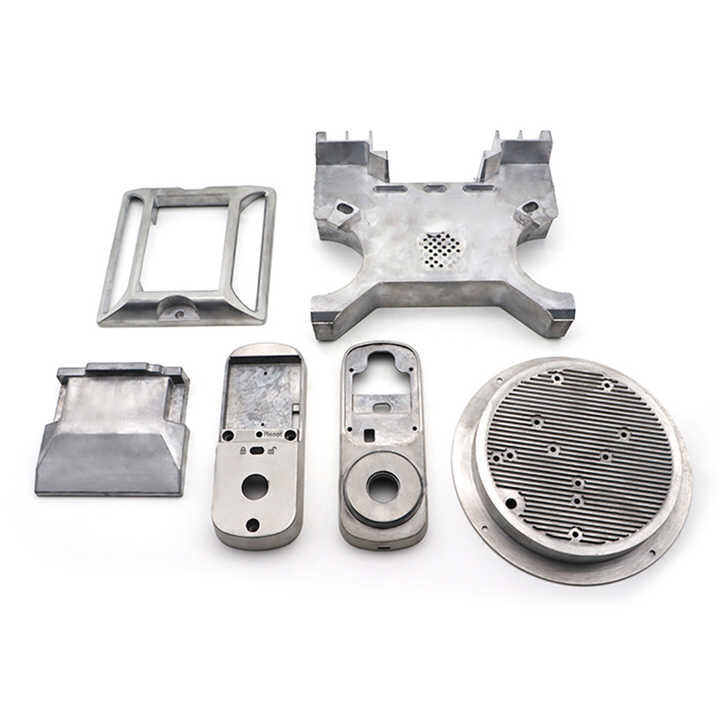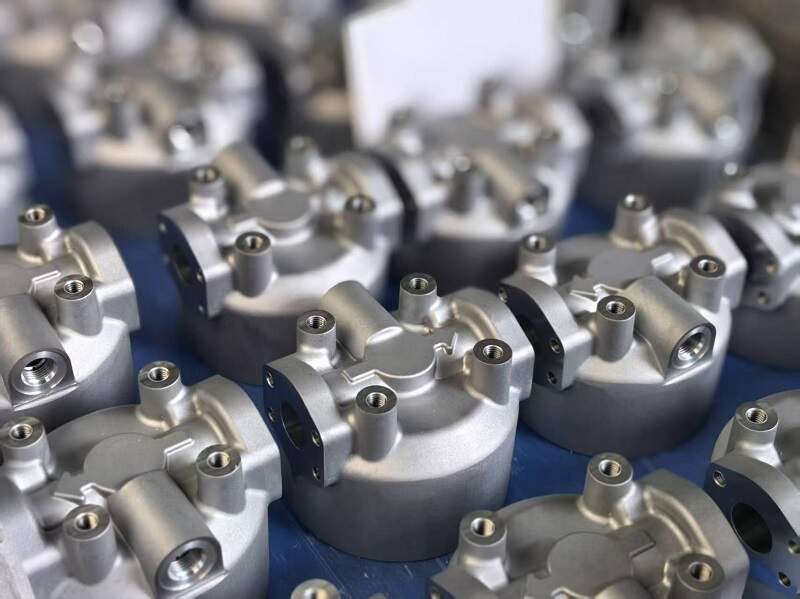Just How Foundry Solutions Enhance Manufacturing Performance and High Quality in Industrial Applications
Shop services play an essential function in boosting manufacturing performance and top quality throughout various commercial applications. By applying innovative steel casting strategies, these solutions assure elements are produced with precision and consistency. This not only reduces lead times however additionally minimizes waste, promoting better partnership in between producers and factories. The impact of top quality parts on operational efficiency raises vital inquiries concerning the future of commercial production. What innovations lie ahead in this developing landscape?
The Duty of Factory Services in Streamlining Manufacturing Processes

Foundries typically provide knowledge in alloy development, enabling manufacturers to utilize advanced products that boost product performance. The cooperation in between makers and shops fosters a better understanding of manufacturing demands, bring about maximized processes and improved product designs. By leveraging shop solutions, suppliers can attain higher flexibility, adjust to transforming market needs, and preserve competitiveness in the industry. On the whole, the function of factory services is vital in helping with a more cost-efficient and efficient manufacturing landscape.
Advanced Technologies in Foundry Operations
Innovative modern technologies are transforming factory operations, considerably boosting efficiency and precision. Automation plays a vital function, with robotic systems simplifying repetitive tasks such as molding and product handling. In addition, improvements in computer-aided design (CAD) and computer-aided production (CAMERA) systems enable foundries to produce intricate geometries with higher accuracy and lowered product waste.
The combination of fabricated knowledge (AI) and device understanding boosts high quality control by keeping an eye on processes in real-time and forecasting prospective issues before they happen. Making use of innovative products, such as lightweight alloys and compounds, further enhances the performance qualities of actors items.
In addition, 3D printing technology is revolutionizing prototyping and tooling, permitting rapid personalization and minimized preparations. Jointly, these innovative innovations not just raise production effectiveness yet also guarantee that the final items fulfill strict high quality criteria, placing shops at the forefront of contemporary industrial applications.
Minimizing Lead Times Through Effective Foundry Practices
Effective factory practices play an essential function in decreasing preparations within production settings. By applying streamlined production procedures and progressed organizing techniques, producers can improve operations and enhance source appropriation. These renovations not only speed up outcome yet also add to overall operational efficiency.
Structured Production Procedures
Simplifying production procedures is essential for reducing lead times in the production field. Reliable shop methods, consisting of maximized process and source management, play a crucial role in achieving this objective. By reducing waste and improving communication amongst groups, factories can considerably improve their operational effectiveness. The application of standardized procedures likewise adds to regular quality and faster turn-around times, making it possible for suppliers to respond even more swiftly to market needs. In addition, the combination of sophisticated technologies, such as automation and real-time surveillance systems, helps in identifying traffic jams and helping with prompt interventions. On the whole, a concentrate on streamlined production procedures not only accelerates lead times yet also boosts the total competition of industrial applications, ensuring that products meet consumer assumptions efficiently.
Advanced Organizing Techniques
Efficient production processes naturally lead makers to discover sophisticated organizing strategies as a way to further minimize lead times. By utilizing advanced formulas and software program, factories can optimize process, aligning manufacturing timetables with demand forecasts and source schedule. Strategies such as Just-In-Time (JIT) organizing minimize stock costs while making sure timely product delivery, thereby boosting functional performance. Furthermore, incorporating real-time information analytics permits foundries to anticipate prospective delays and adjust timetables proactively. This flexibility not just streamlines procedures but additionally boosts total productivity. Collective preparation with providers and consumers can foster a more integrated supply chain, additional minimizing lead times. Eventually, these sophisticated organizing techniques encourage foundries to accomplish higher efficiency and remarkable top quality in their production procedures.
Making Sure Precision and Quality in Metal Spreading
Guaranteeing accuracy and high quality in metal spreading needs a thorough method that includes every stage of the production process. This process begins with careful style and design of the mold and mildews, assuring they can hold up against the molten metal's temperature and pressure. The choice of premium raw products is vital, as pollutants can compromise the end product.
As soon as the materials are prepared, accurate temperature level control during melting and putting is fundamental to achieve the desired buildings in the actors metal. Keeping an eye on solidification and air conditioning rates more guarantees dimensional accuracy and surface finish.
Quality guarantee practices, such as non-destructive testing and assessment, are crucial to determining problems early in the procedure. Precision aluminum casting. In addition, employing experienced workers that recognize the subtleties of steel casting adds significantly to maintaining high criteria. In general, these practices collectively boost the dependability and performance of cast parts in numerous commercial applications
Minimizing Waste and Maximizing Resource Use

Furthermore, reusing scrap metal within the foundry itself can substantially reduce waste, transforming byproducts right into useful sources. Lean manufacturing principles also add to throw away decrease by improving procedures and getting rid of unnecessary steps, bring about extra efficient procedures.
Regular maintenance of devices warranties peak efficiency, preventing break downs that can result in squandered materials. By concentrating on these approaches, factories not only minimize image source costs however additionally add to sustainable techniques, read the full info here straightening with the expanding need for ecologically liable production methods in commercial applications.
The Affordable Benefit of High-Quality Elements out there
High-quality parts provide a considerable competitive benefit in the shop market, where accuracy and durability are critical. Makers that focus on exceptional materials and craftsmanship can boost item performance and dependability, resulting in raised client fulfillment. This advantage is specifically apparent in markets such as automobile and aerospace, where component failing can have tragic effects.
High-grade components commonly result in lower maintenance costs and expanded item life-spans, which can be enticing selling factors for potential customers. As market needs grow for sustainable and effective technologies, the emphasis on quality comes to be much more vital. Firms that purchase high-grade foundry solutions not only enhance their manufacturing processes however additionally differentiate themselves from rivals who may compromise quality for cost savings. The commitment to top notch elements inevitably converts right into a stronger market placement and long-lasting company success.
Frequently Asked Concerns
What Types of Products Do Foundry Solutions Commonly Collaborate With?
Shop solutions normally collaborate with steels such as light weight aluminum, steel, brass, and iron, along with numerous alloys. They likewise deal with materials like ceramics and composites, satisfying diverse commercial demands and specs in manufacturing procedures.
How Do Factory Solutions Influence Overall Supply Chain Administration?
Factory solutions significantly enhance supply chain administration by improving material sourcing, reducing preparations, and ensuring consistent high quality. Their ability to provide tailored solutions cultivates cooperation among stakeholders, eventually boosting total operational performance and responsiveness in manufacturing.
What Industries Benefit Many From Shop Solutions?
Industries such as vehicle, building and construction, customer, and aerospace products greatly benefit from factory solutions. These industries depend on precision castings to fulfill rigid quality criteria and enhance their overall production processes and product performance.
Are Shop Providers Lasting and Eco Pleasant?
Factory services can be ecologically friendly and lasting, especially when employing advanced innovations and procedures - Aluminum Casting Company. Technologies such as recycling products, minimizing discharges, and maximizing power use add to lessening their ecological influence in industrial applications

Just How Can Business Select the Right Factory Company?
Companies can pick the best foundry service company by assessing expertise, manufacturing capabilities, quality certifications, technology used, customer reviews, and sustainability techniques while making sure positioning with their specific project needs and lasting business goals.
Shop solutions play a crucial function in improving manufacturing performance and top quality throughout numerous industrial applications. The partnership between suppliers and shops cultivates a better understanding of manufacturing requirements, leading to enhanced procedures and improved product styles. Efficient shop practices play click this link a necessary duty in decreasing lead times within manufacturing environments. By using innovative formulas and software program, factories can optimize process, straightening manufacturing routines with need forecasts and source availability. Firms that invest in high-grade foundry solutions not only enhance their manufacturing procedures yet also distinguish themselves from rivals who may give up top quality for expense savings.